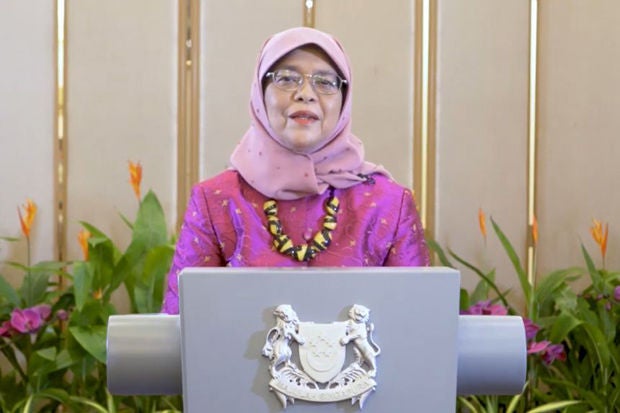Singapore General Hospital will NEVER ask you to transfer money over a call. If in doubt, call the 24/7 ScamShield helpline at 1799, or visit the ScamShield website at www.scamshield.gov.sg.
We’d love to hear from you! Rate the SGH website and share your feedback so we can enhance your online experience and serve you better. Click here to rate us
Whole-of-nation approach needed to tackle mental health issues; youth of particular concern: President Halimah

President Halimah Yacob speaking virtually at the Asia Pacific Conference and Meeting on Mental Health on Oct 7, 2021PHOTO: HALIMAH YACOB/FACEBOOK
SINGAPORE - The cross-cutting nature of mental health issues means that a whole-of-nation effort is needed to help people with mental health conditions, President Halimah Yacob said on Thursday (Oct 7).
Speaking at the Asia Pacific Conference and Meeting on Mental Health 2021, which was held virtually and hosted by mental health advocacy organisation Silver Ribbon Singapore, Madam Halimah said that beyond receiving help from the Government, the community can also play a larger role in this.
This is the third time the event is being held, with the two previous occasions in 2016 and 2011.
"With the necessary support, social service agencies may be in a good position to provide care in a community setting to persons with mental health conditions, given their close proximity to homes and connection with the ground. This is an area where I hope our social sector can step up and help to amplify government-led efforts," she said.
Madam Halimah added that she was "particularly concerned" about the challenges the younger generation faces and noted that from 2015 to 2020, the number of adolescents seen at the Institute of Mental Health (IMH) for depression rose by about 60 per cent.
"Anecdotally, we also hear of more students facing stress-related issues over time. We need to do something urgently as a community to arrest this trend," she said.
Madam Halimah also said that the President's Challenge designated mental health as its focus in 2018 and has since allocated around $1.8 million to support various programmes in this area.
She added that she recently invited IMH to partner the President's Challenge in developing a pilot curriculum to better prepare social service agencies to manage youth with mental health conditions.
Ms Ngo Lee Yian, executive director of social service agency Singapore Association for Mental Health, welcomed the move, saying it was "positive and timely".
Such a curriculum would help enhance the standards of care for these youth, she added.
Mr Cho Ming Xiu, founder and executive director of Campus PSY, a social service agency focusing on youth, called the curriculum a "great initiative".
"A standardised curriculum will help set a professional standard among the different social service agencies," he told The Straits Times.
He also pointed out that social service agencies currently face issues with funding and manpower, and that more could be done in these areas.
Ms Ngo agreed but added that such resources should be provided in a sustainable manner, and not as a one-off.
Agreeing that social service agencies play an important role in helping those with mental health conditions, she said: "Today, stigma is still entrenched as we continue to work alongside various stakeholders to address the complex and evolving mental health needs of the society, especially due to the pandemic. Being in the heartland enables us to be more connected, inclusive and less daunting for people to reach out to us."
On the subject of young people, Mr Cho said that youth today face a wide array of challenges.
Those at school have to deal with academic pressure and increasing competition, which are exacerbated by social media.
"When you're on social media, usually what you'll see is either the news on Covid-19 or news about your friends doing well… which is not good for mental health," said Mr Cho.
Home-based learning measures also prevent young people from meeting their friends at school, which may result in social isolation.
Meanwhile, young working adults may struggle with uncertainty over their jobs and finances due to Covid-19, while also juggling increased pressure to settle down and start a family, said Mr Cho.
He added that it is important to focus on upstream solutions, such as identifying the early signs of mental health conditions among young people while they are still at school.
This will help prevent the spiralling down to more severe mental health conditions in future, he said.
Professor Fatimah Lateef, senior consultant of emergency medicine at Singapore General Hospital, who also spoke at the conference, said people must seize the momentum generated by the pandemic to tackle mental health conditions.
"Never before have we had so much focus on mental health on the agenda of the leadership of countries, institutions and organisations... Awareness of the importance of mental health is really at its peak now, and we must strike while the iron is hot," she said.
Among other things, Prof Fatimah also highlighted the importance of hope in helping people cope with mental health conditions.
Some ways that people can help give hope to others include simply listening to them, being non-judgmental and valuing them for who they are.
"Once hope is instilled in a person, it functions as an internal resource for that person, and becomes a major source of motivation for positive change," she said.
Contributed by
Stay Healthy With
Outram Road, Singapore 169608
© 2025 SingHealth Group. All Rights Reserved.




















